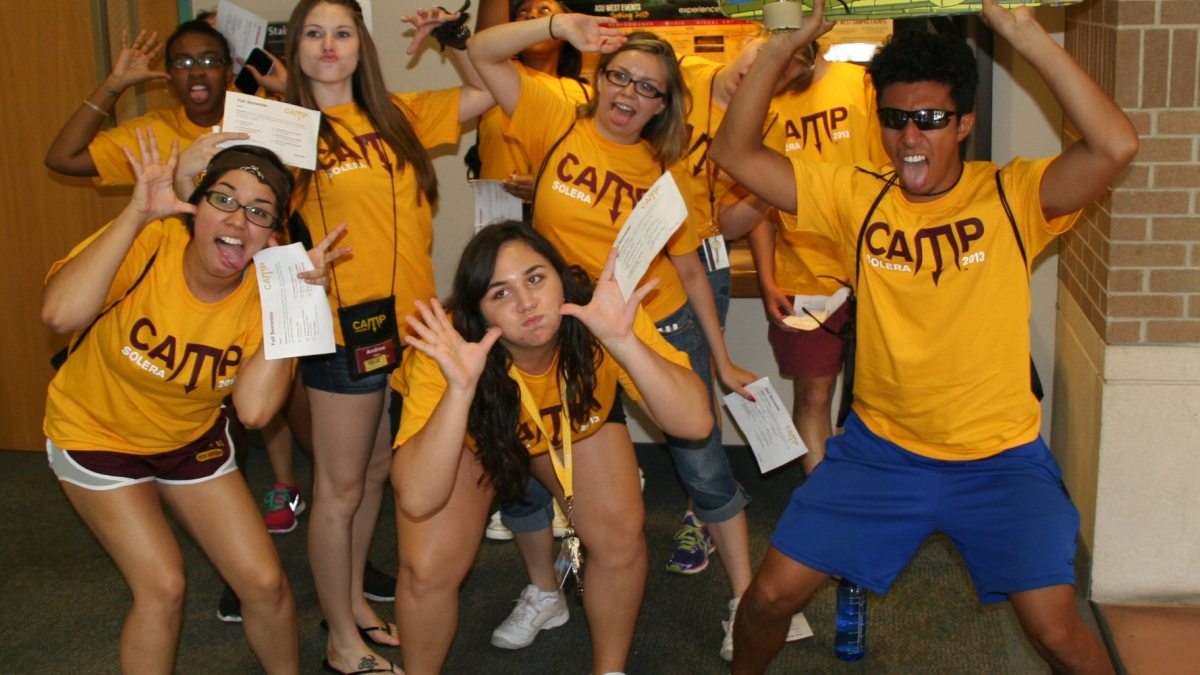Camp Solera welcomes West campus freshmen

Any sign of the summer doldrums disappeared on Aug. 19, as ASU’s West campus welcomed more than 200 enthusiastic freshman students to Camp Solera.
Unique to the West campus, Camp Solera is a three-day experience designed to build class unity through group challenges, introduce freshmen to university and campus resources, and give the newest members of the Sun Devil family a sneak peek into ASU traditions.
“I feel I’m better prepared to get started with my ASU experience, thanks to Camp Solera,” said Chloe Morrow from Anthem, Ariz. “It’s a great way to meet people and learn about the campus.”
Morrow, who will major in psychology through ASU’s New College of Interdisciplinary Arts and Sciences, is planning to supplement her academic experience by getting involved with student clubs and organizations. She also has been hired as a staff member at the Sun Devil Fitness Complex on the West campus.
Forensics major Sandra Vazquez, a native of Mexico who graduated from Independence High School in Glendale, Ariz., echoed Morrow’s sentiments about the value of Camp Solera. “I’m meeting a lot of people, and I just found out about all of the fitness classes that will be offered in the gym this semester,” Vazquez said as she left the Sun Devil Fitness Complex to head to the next event on the Camp Solera agenda. Vazquez hopes that her forensics degree through New College will lead her to a career as a lab scientist with the FBI.
Camp Solera was launched in 2009 and graduated its first cohort in May. Student participants are enrolled in bachelor’s degree programs on the West campus through New College, the Mary Lou Fulton Teachers College, the W. P. Carey School of Business and the School of Letters and Sciences. Some also are admitted to Barrett, the Honors College, which maintains an active presence at West.
While most of the students at the 2013 Camp Solera were from Arizona, a number of states were represented, including Michigan, California and Minnesota. Some participants were from foreign countries as well.
In addition to building teamwork among students, Camp Solera requires teamwork among faculty and staff, according to Sharon Smith, interim dean of students at the West campus. ASU entities involved with staging the event included Educational Outreach and Student Services, University Housing, New College, Teachers College, the Carey School and Barrett.
Students at Camp Solera participated in sessions in which they discussed their goals, and issues such as diversity. They also took part in several team-building activities, like constructing boats for a cardboard boat regatta and conquering a low ropes course. Evenings provided the chance to relax and enjoy live entertainment.
“Students participating in Camp tend to be more engaged with their colleges and assume many leadership roles in student clubs and organizations, as well as colleges and campus departments,” Smith said.
“Camp Solera is a great way to get acclimated to the campus environment,” said psychology major Mason Long, an Arizona native and graduate of Moon Valley High School in Phoenix, who aspires to become a police officer after graduation.
When fellow psychology major Morrow was asked if she considered attending other universities besides ASU, “I didn’t even think about it,” was her response. “ASU was the obvious choice.”